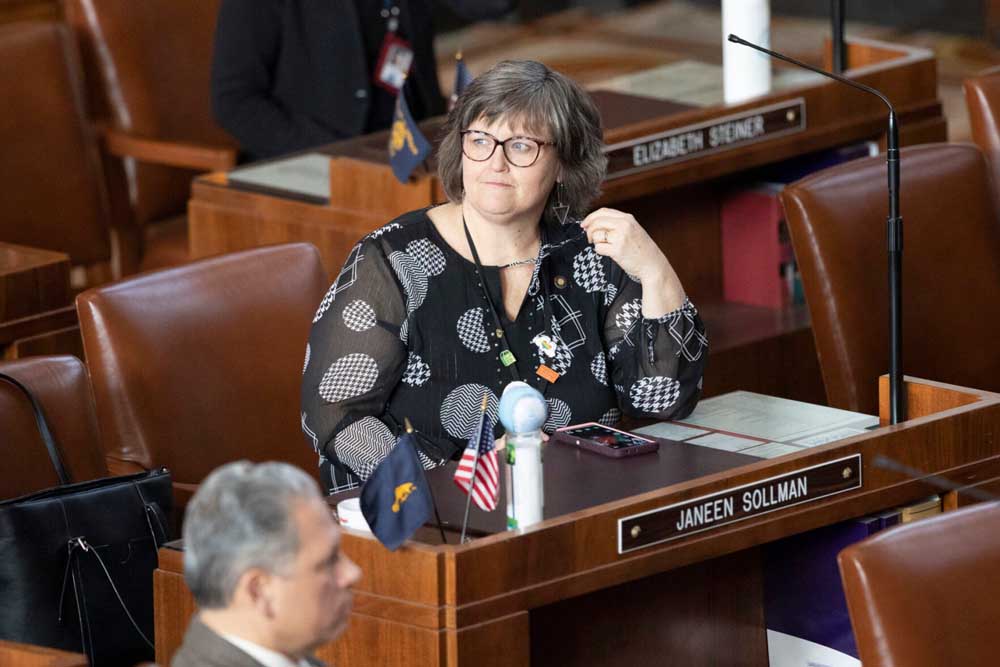Republicans intensify opposition to capping bills per session in Oregon
Published 6:39 am Friday, May 30, 2025

- Sen. Janeen Sollman, D-Hillsboro works on the Senate floor at the Oregon State Capitol in Salem on Wednesday, Feb. 15, 2023.
The legislation faced a mixed reception at its first committee hearing Thursday.
Despite bipartisan support for an Oregon bill limiting the amount of legislation a lawmaker can introduce every session, the measure has angered some prominent Republican lawmakers, who called it a partisan power grab during its first committee hearing.
Three of the bill’s leading supporters — Sen. Janeen Sollman, D-Hillsboro, former Senate Republican Leader Tim Knopp, and House Speaker Julie Fahey — argued in front of the House Committee on Rules on Thursday that the number of bills the Legislature has had to consider in the past session has been overwhelming. They described the onslaught of reviews staff and legislative analysts must conduct to draft legislation as swamping the public with excessive bureaucracy that impedes good governance.
“Each bill takes staff time, legal review, printing, scheduling,” said Fahey, D-Eugene. “Thousands of taxpayer dollars go into processing bills that don’t become law or even get here. What we’re talking about today — being more focused and deliberative in how we introduce legislation — isn’t about stifling good ideas. It’s about improving the system.”
Trending
House Bill 2006, introduced in mid-April by six Democrats and five Republicans, would cap individual lawmakers to requesting 25 drafts during the 160-day long sessions in odd years. Lawmakers have historically limited bills in the 35-day short sessions in even years — in 2024, for instance, lawmakers could introduce two bills apiece.
The number of bills lawmakers have been considering in the past years has increased steadily, particularly during odd years. This session, legislators have introduced more than 3,400 pieces of legislation since February.
Republicans on the committee, however, said further limits on the legislative process would continue to shut them out of opportunities to pass legislation in the minority. The new bill revives another limitation effort that popped up after the last time the Oregon Legislature saw a record number of bills introduced — nearly 3,300 in 2001. At that time, lawmakers considered similar restrictions that eventually failed in the Senate, which was controlled by Republicans at the time.
“I routinely propose bills that are similar to other bills in the building and the only reason for that is because my district wants me to have that voice,” said House Republican leader Rep. Christine Drazan, R-Canby. “And what ends up moving is the Democrat bill time and again.”
Other provisions of the legislation include allowing 400 bills for state agencies and the governor to introduce, 15 bills for each legislative committee, 25 apiece for the secretary of state, attorney general, state treasurer and commissioner of the Bureau of Labor and Industries, and 100 for the Judicial Department.
The Joint Ways and Means Committee is excluded from the bill. The bill wouldn’t preclude sponsors from introducing more than 25 pieces of legislation if, for instance, another sponsor requested the drafting from legislative counsel.
Trending
Rep. Shelly Boshart Davis, R-Albany, said the idea of bill limits “is great,” but that the bill is “extremely problematic.” She noted that the legislation would allow for the Senate president and speaker of the House to authorize additional measures for members or committees. Combined with the 400 measures the governor and state agencies could introduce, “that’s a problem,” she said.
“You have the majority party being able to authorize,” she said. “There’s no limit on that.”
The opposition to the bill doesn’t fall squarely along partisan lines, however. One Democrat has called the bill “capricious” and warned of unintended consequences for lawmakers.
“The meager number of vehicles would more than likely accomplish the following: increased authority for the Speaker, the Majority Leader, and most policy committee chairs,” wrote Rep. Paul Evans, D-Monmouth, in a Wednesday letter to the committee. He has filed the most bills this session as a single lawmaker — over 300. “This will exacerbate the power differential between leadership, policy, and budget specialists.”
During the hearing, however, Fahey said she agreed that 400 bills for state agencies and the governor was an excessive estimate, though it was not clear how far she’d be willing to lower the limit. Another Representative, Jason Kropf, D-Bend, said that even 300 bills would be going too far.
“We use the exact same limits and language in the bill, with two exceptions, increasing the baseline number of bills from legislators to 20 to 25 and the number of committee bills from 10 to 15,” Fahey told the committee. “This drafted bill will go into effect in the 2027 session. Back in 2001, that bill had bipartisan support and bipartisan opposition, and I fully expect that this bill will have the same.”
Passing the legislation would make Oregon the 14th state in the nation to put explicit laws on the books that restrict the amount of bills a legislator can introduce. The bill would essentially make the maximum number of bills per session on an odd-year at least 2,850, if each lawmaker, committee, agency, state official and the governor introduced the maximum number of bills they are allowed under the legislation. Because the Joint Committee on Ways and Means is excluded from the legislation, that number is likely an undercount.
Another piece of legislation, Senate Bill 1006 by Sen. Kim Thatcher, R-Keizer, would limit introductions of bills to committees and legislators, preventing agencies from introducing legislation. It has been parked in the Senate Committee on Rules since March.
This article was originally published by Oregon Capital Chronicle and used with permission. Oregon Capital Chronicle is part of States Newsroom and can be reached at info@oregoncapitalchronicle.com.







